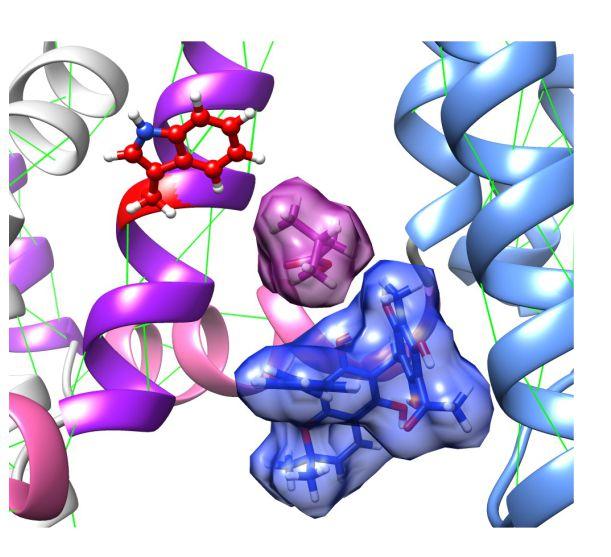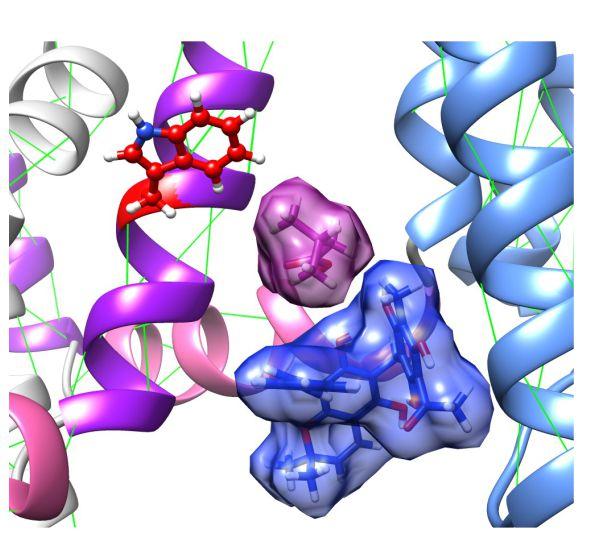
Credit: Geoff Abbott, PhD, UCI School of Medicine
Irvine, CA – October 10, 2018 – Researchers in the Department of Physiology & Biophysics at the University of California, Irvine School of Medicine have discovered the molecular basis for a therapeutic action of an ancient herbal medicine used across Africa to treat various illnesses, including epilepsy.
The herbal medicine, a leaf extract from the shrub Mallotus oppositifolius, was previously found to be effective in controlling seizures but the mechanism was unknown. The discovery, published in Nature Communications, found that two components of the Mallotus leaf extract activate KCNQ2/3, a potassium ion channel essential for controlling electrical activity in the brain. The two components were somewhat effective alone, but in combination were highly effective both at activating KCNQ2/3 channels and at preventing life-threatening seizures.
The UCI research team, comprising postdoctoral fellow Rían Manville, PhD and principal investigator Geoffrey Abbott, MSc, PhD, screened individual compounds from the leaf extract for channel opening activity, and then combined the two most active compounds to discover the therapeutic synergy contained in an African folk remedy used for centuries. Strikingly, one of the two compounds identified, isovaleric acid, is also a main component of valerian root, an herb used in ancient Greece as an insomnia sleep remedy, and for centuries by the English and also native Americans as an anticonvulsant. Valerian root is still used by as many as 2 million people each week in the United States as an herbal remedy for anxiety and insomnia.
"We are very interested in taking a molecular approach to ethnobotany – the study of plants and their use by local populations – to discover the molecular mechanisms for ancient remedies and to use this knowledge to create safer and more effective drugs. The KCNQ channels we study are typically opened by electrical activity, but we know that they are also incredibly sensitive to the presence of small molecules, including neurotransmitters, but also molecules from outside, such as drugs, and constituents of food and herbal extracts," said Abbott. "Some folk medicines are in danger of being lost, either because traditional practices are being forgotten, or because the plant species used are endangered. Species loss can arise from over-collecting, habitat destruction, or climate change. There is a race against time to prevent this incredible resource being lost forever."
The UCI team found that the herbal extract they studied had different channel subtype preferences than modern drugs that activate the KCNQ2/3 channel, such as the anticonvulsant drug, retigabine. Because of this, by combining the herbal compounds with retigabine, they were able to completely lock open the channel, a feat not previously achieved.
"Locking open the channel is a neat trick, but it could also have clinical implications. Retigabine was removed from the market last year because of a surprising side effect: it turns the skin and whites of the eyes blue. However, by combining retigabine with the herbal components, we found we could greatly reduce the retigabine dosage required for activity. This type of strategy might one day enable us to use drugs like retigabine at dosages low enough to be safe, whilst retaining or even enhancing their efficacy by combining them with natural booster compounds derived from plants," said Abbott.
In addition to the booster effects of the herbal extract, identification of the ability of specific chemicals within plants to activate influential ion channels such as KCNQ2/3 may lead one day to new epilepsy, anxiety and pain drugs that exploit the alternative chemical spaces offered by the molecular constituents of ethnobotanicals.
###
This study was supported by the US National Institutes of Health (GM115189).
About the UCI School of Medicine
Each year, the UCI School of Medicine educates more than 400 medical students, as well as 200 doctoral and master's students. More than 600 residents and fellows are trained at UC Irvine Medical Center and affiliated institutions. The UCI School of Medicine offers an MD degree, a dual MD/PhD medical scientist training program, PhDs and master's degrees in anatomy and neurobiology, biomedical sciences, genetic counseling, epidemiology, environmental health sciences, pathology, pharmacology, physiology and biophysics, and translational sciences. Medical students also may pursue an MD/MBA program, a combined MD/Master's in Public Health or a dual MD/master's program called the Program in Medical Education for the Latino Community (PRIME-LC). UCI School of Medicine is accredited by Liaison Committee on Medical Accreditation (LCME), and ranks among the top 50 nationwide for research. For more information, visit: som.uci.edu.
About the University of California, Irvine
Founded in 1965, UCI is the youngest member of the prestigious Association of American Universities. The campus has produced three Nobel laureates and is known for its academic achievement, premier research, innovation and anteater mascot. Led by Chancellor Howard Gillman, UCI has more than 30,000 students and offers 192 degree programs. Located in one of the world's safest and most economically vibrant communities, UCI is Orange County's second-largest employer, contributing $5 billion annually to the local economy. For more on UCI, visit http://www.uci.edu.
Media Contact
Anne Warde
[email protected]
714-276-3552
@UCIrvine
http://www.uci.edu
Related Journal Article
http://dx.doi.org/10.1038/s41467-018-06339-2





